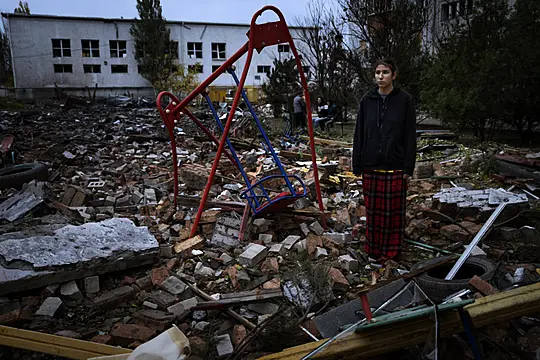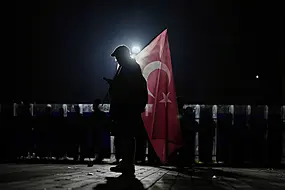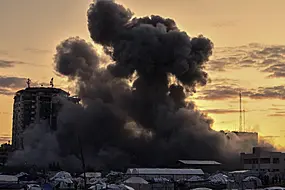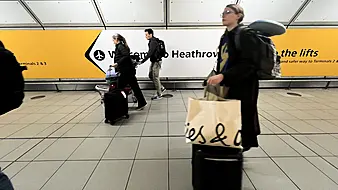Ukrainian authorities have tried to dampen public fears over Russia’s use of Iranian-built drones by claiming increasing success in shooting down the small aircraft.
Ukrainians are bracing for less electricity this winter following a sustained Russian barrage on infrastructure across the country in recent weeks.
Meanwhile, citizens in the southern city of Mykolaiv lined up for water and essential supplies as Ukrainian forces continued their advance on the nearby Russian-occupied city of Kherson.
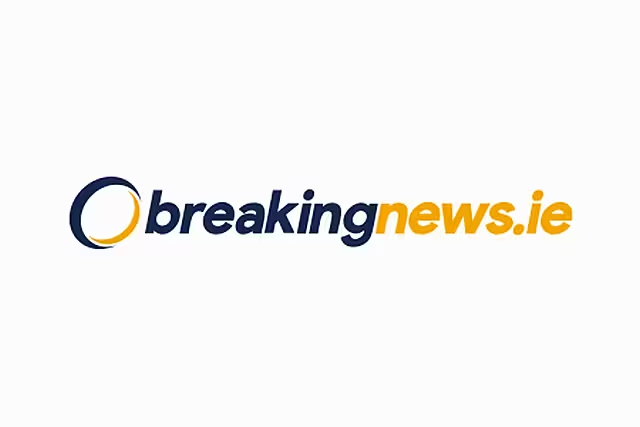
Ukraine’s forces have shot down more than two-thirds of the approximately 330 Shahed drones that Russia has fired up to Saturday, the head of Ukraine’s intelligence service said.
Kyrylo Budanov said that Russia’s military had ordered about 1,700 units of various types of drones, and a second batch of about 300 Shaheds is currently being rolled out.
“Terror with the use of ‘Shaheds’ can actually last for a long time,” he was quoted as saying in the Ukrainska Pravda newspaper, adding: “Air defence is basically coping, 70% are shot down.”
Both Russia and Iran deny that any Iranian-built drones have been used in the war.
Mr Budanov also played down speculation that Russian forces are preparing an immediate exit from Kherson, even though an evacuation of civilians and others including banking personnel and teachers is under way.

Mr Budanov said statements to that effect by Russia’s newly appointed commander in Ukraine, General Sergei Surovikin, were aimed at “preparing the ground” in case a full pullout does take place which the Ukrainian official predicted would happen by the end of the year.
“But at the same time I cannot tell you that right now they are fleeing from Kherson,” Mr Budanov said.
Meanwhile, Russian authorities have removed monuments of 18th-century Russian military chiefs Alexander Suvorov and Fyodor Ushakov from Kherson, saying that the action was intended to save them from Ukrainian shelling of the city.
On Saturday, Russian-installed authorities told all residents of Kherson to leave “immediately” ahead of an expected advance by Ukrainian troops waging a counter-offensive to recapture the city — a key route to Russian-occupied Crimea — which has been in Russian hands since the early days of the war.
Ukraine’s relentless artillery strikes on Kherson have cut the main crossings across the Dnieper River, which bisects southern Ukraine, leaving Russian troops on the west bank short of supplies and vulnerable to encirclement.
The region is one of four that Russian President Vladimir Putin illegally annexed last month and put under Russian martial law last week.
Britain’s Ministry of Defence, in an intelligence update posted on Twitter, said Russia was “likely” to use a high number of Shahed drones to penetrate “increasingly effective Ukrainian air defences” in part to substitute for Russian-made long-range precision weapons “which are becoming increasingly scarce”.
Latest Defence Intelligence update on the situation in Ukraine - 24 October 2022
Find out more about the UK government's response: https://t.co/jVDRARAQjJ
🇺🇦 #StandWithUkraine 🇺🇦 pic.twitter.com/rWoxv4qHni— Ministry of Defence 🇬🇧 (@DefenceHQ) October 24, 2022
That assessment came on top of a stark warning by Russian Defence Minister Sergei Shoigu to key Western and Turkish counterparts over the weekend that Ukrainian forces were preparing a “provocation” involving a radioactive device — a so-called “dirty bomb”.
Britain, France, and the United States — who got calls from Mr Shoigu on the matter, along with Turkey — rejected that claim.
Turkey’s defence ministry on Sunday said that defence minister Hulusi Akar discussed bilateral relations and security issues with Mr Shoigu, including “the need to be cautious about provocations that could worsen the security situation in the region”.
Russia’s defence ministry said Mr Shoigu raised the prospect of “possible Ukrainian provocations involving a dirty bomb”, which is a device that uses explosives to scatter radioactive waste. Such weapons don not have the devastating destruction of a nuclear explosion, but could expose broad areas to radioactive contamination.
German defence minister Christine Lambrecht, visiting an elite German unit in south-western Germany on Monday, dismissed as “outrageous” the claim that Ukraine could use a dirty bomb, saying there were “zero indications” of that.
Moscow on Monday strongly backed Mr Shoigu’s claim. In a call with reporters, Kremlin spokesman Dmitry Peskov insisted that Mr Shoigu’s warning reflected a real threat.
“Their distrust of the information that has been provided by the Russian side doesn’t mean that the threat of using such a dirty bomb doesn’t exist,” said Mr Peskov.
In a televised address on Sunday evening, Ukrainian President Volodymyr Zelensky suggested that Moscow itself was setting the stage for deploying a radioactive device on Ukrainian soil.
“If Russia calls and says that Ukraine is allegedly preparing something, it means only one thing: that Russia has already prepared all of it,” Mr Zelensky said.
